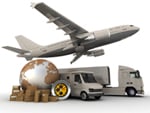
JAPAN – 2011 may well be remembered as an annus horribilis by those in the freight and passenger industries with the unsettled situation in North Africa now breaking out into an international conflict to add to the earthquakes which have rocked New Zealand and Japan in recent days. Good logistics are essential when one is faced by a disaster of the scale faced currently in Japan where the tsunami has devastated large areas and caused a major nuclear alert as well as disrupting container and bulk freight shipping schedules.
According to the latest information available from the International Air Transport Association (IATA), World Health Organization, the International Atomic Energy Agency, the World Meteorological Organization, the International Maritime Organization and the International Civil Aviation Organization, international flight and maritime operations can continue normally into and out of Japan’s major airports, including both Haneda and Narita, and all sea ports excluding those directly damaged by the tsunami.
Other conflicting reports say that services at the main airports are being restricted due to a limited fuel supply. Japan produces 3-4% of global jet fuel supply, some of which is exported to Asia. Some of this refinery capacity has been lost due to damage caused by the earthquake and ensuing water damage. This supply restriction, coupled to the current Middle East situation could lead to higher jet fuel prices.
Already reports are coming in from Malaysia to the effect that intra Asian air cargo rates are up between 50 and 60% and ‘emergency’ surcharges are being imposed on ocean freight containers within the week. It is said that emergency bunker charges will be imposed on all air freight cargo unless destined for Japan itself.
Currently available information indicates that increased levels of radiation have been detected at some airports, but these do not represent any health risk. In the meantime US import officials are increasing the levels of scanning inward containers for radiation. This is routinely done anyway but the authorities are insisting on extra vigilance.
The US Coast Guard have issued a notice to all shipping en route to America to avoid passing within 50 miles of the damaged nuclear reactors. Ships which pass within the radiation buffer zone must report for inspection before sailing to within 100 miles of the US coastline (details HERE). The U.S. Coast Guard site will provide an updated notice as additional guidance becomes available but ship owners and operators should keep abreast of information being provided by the Japanese Government relating to any further developments.
Container sailing schedules are being adapted as the situation unfolds, the ports at Hachinohe, Hitachi, Hitachinaka, Ishinomaki, Kamaishi, Kashima, Ofunato, Onahama, Sendai-Shiogama and Soma have all suffered serious damage and shippers are advised to check with their carriers directly for updates and news of re-routings. It is likely that the difficulty of maintaining fuel supplies, plus the need to utilise all available port facilities for the urgent import of emergency aid will continue to impact on the ocean freight sector for some time.
Meanwhile Mitsui OSK Line (MOL) who we reported on last week, have issued more details of both the aid they have so far provided plus news on how they will continue efforts to try and mitigate the problems afflicting their home country. MOL Ferry Company Ltd., a Mitsui subsidiary, transported about 2,700 Japan Self-Defence Forces (JSDF) personnel and about 930 emergency vehicles from Tomakomai in Hokkaido to Aomori, the capital of Aomori prefecture, on the main island of Honshu. The transport support was accomplished with four ferries, which made eight trips in total as part of MOL’s ongoing effort to provide aid to the quake- and tsunami stricken areas.
The group is to provide containers for relief supplies to container yards at their normal available loading ports before the end of May 2011. As shipping capacity is limited, transport of those supplies will be on a first-come first-shipped basis. This offer covers grant aid supplies from public institutions such as governmental institutions and municipalities, or government-approved aid organizations to be shipped to disaster areas like the earthquake affected Tohoku district. However, some of the items such as dangerous articles, animals, and other regulated items may not be accepted.
Portions of this article were taken from the Handy Shipping Guide.
As improvements are made in Japanese freight, we will post these improvements on our website. For information about freight, cargo and container shipping from Houston and the Untied States, please contact pack n send at 713 266 1450.





 We pick up & deliver worldwide, as well as in our backyard.
We pick up & deliver worldwide, as well as in our backyard.